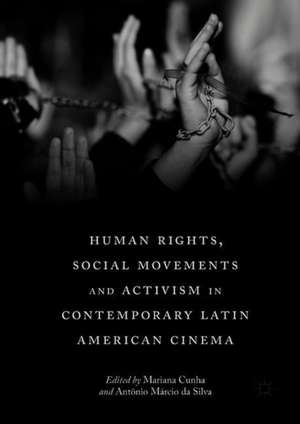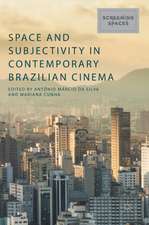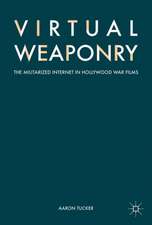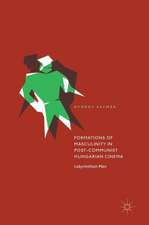Human Rights, Social Movements and Activism in Contemporary Latin American Cinema
Editat de Mariana Cunha, Antônio Márcio da Silvaen Limba Engleză Hardback – 27 sep 2018
Chapters in the volume explore the prison system, state violence, the Mexican dirty war, the Chilean dictatorship, debt, transnational finance, indigenous rights, social movement, urban occupation, the right to housing, intersectionality, LGBTT and women’s rights in the context of a number of Latin American countries. By so doing, it assesses the long overdue relation between cinema and human rights in the region, thus opening new avenues to aid the understanding of cinema’s role in social transformation.
| Toate formatele și edițiile | Preț | Express |
|---|---|---|
| Paperback (1) | 562.65 lei 3-5 săpt. | +16.53 lei 7-11 zile |
| Springer International Publishing – 3 ian 2019 | 562.65 lei 3-5 săpt. | +16.53 lei 7-11 zile |
| Hardback (1) | 787.47 lei 6-8 săpt. | |
| Springer International Publishing – 27 sep 2018 | 787.47 lei 6-8 săpt. |
Preț: 787.47 lei
Preț vechi: 960.33 lei
-18% Nou
Puncte Express: 1181
Preț estimativ în valută:
150.69€ • 157.85$ • 124.88£
150.69€ • 157.85$ • 124.88£
Carte tipărită la comandă
Livrare economică 08-22 aprilie
Preluare comenzi: 021 569.72.76
Specificații
ISBN-13: 9783319962078
ISBN-10: 3319962078
Pagini: 244
Ilustrații: XI, 262 p. 19 illus. in color.
Dimensiuni: 148 x 210 mm
Greutate: 0.6 kg
Ediția:1st ed. 2018
Editura: Springer International Publishing
Colecția Palgrave Macmillan
Locul publicării:Cham, Switzerland
ISBN-10: 3319962078
Pagini: 244
Ilustrații: XI, 262 p. 19 illus. in color.
Dimensiuni: 148 x 210 mm
Greutate: 0.6 kg
Ediția:1st ed. 2018
Editura: Springer International Publishing
Colecția Palgrave Macmillan
Locul publicării:Cham, Switzerland
Cuprins
1. Introduction.- 2. Human Rights and the Shadow of Chile’s Dictatorship: Patricio Guzmán and the Poetics of a Cinematic Landscape.- 3. Rewriting the History of the Urban Revolutionary: Documentary Film and Human Rights Activism in Post-Dirty War Society.- 4. Human Rights Abuses and State Violence in Prison Films by Hector Babenco.- 5. Territories, Existence and Identities: Indigenous Peoples in Argentine Films.- 6. The Right to Nature: Contested Landscapes and Indigenous Territoriality in Martírio (2016).- 7. Urban Occupations: Cinema and the Struggle for the Right to Housing.- 8. The Art of the Social Movement Corrective: On Redeeming the Human Rights Narrative in También la lluvia and Our Brand is Crisis.- 9. Transnational Finance on the Road to the Andes: Societal Ruptures and Poisoned Deals in La deuda/Oliver’s Deal (2015).- 10. A Woman’s Right to Move: The Politics of Female Walking in Latin American Cinema.- 11. Intersectionality as a Human Rights Issue in Contemporary Latin American Queer Cinema.
Notă biografică
Mariana Cunha is a postdoctoral research fellow (CAPES) at the Federal University of Pernambuco, Brazil. She holds a PhD from Birkbeck, University of London, UK, and has published articles on cinematic space, landscape, nature, Brazilian and global contemporary cinema. She co-edited the volume Space and Subjectivity in Contemporary Brazilian Cinema (Palgrave Macmillan, 2017).
Antônio Márcio da Silva is Associate Lecturer at the University of Surrey and Queen Mary University of London, UK. His publications include the co-edited collection Space and Subjectivity in Contemporary Brazilian Cinema (Palgrave Macmillan, 2017), the monograph The ‘Femme’ Fatale in Brazilian Cinema: Challenging Hollywood Norms (Palgrave Macmillan, 2014) and a number of articles.
Antônio Márcio da Silva is Associate Lecturer at the University of Surrey and Queen Mary University of London, UK. His publications include the co-edited collection Space and Subjectivity in Contemporary Brazilian Cinema (Palgrave Macmillan, 2017), the monograph The ‘Femme’ Fatale in Brazilian Cinema: Challenging Hollywood Norms (Palgrave Macmillan, 2014) and a number of articles.
Caracteristici
Focuses on a variety of themes concerning human rights and activism through the lens of cinema studies, and provides close readings of contemporary films that have often been overlooked in connection to these issues Covers a range of topics and countries in Latin America, serving to open new avenues for debate and inform potential readers of the specificities of the continents’ nations Positioned to have a transnational appeal beyond the Latin American context

























